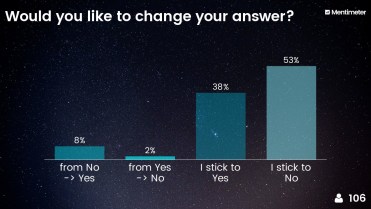Results VNOP, ISED & CAS Research Days
During the VNOP, ISED & CAS Research Days I gave a presentation about responsible research practices. The results of the interactive discussion can be found below.
I asked the audience “To what extent is publication pressure present in your research field?” Apparently, most of the PhD-candidates in the room experience publication pressure. When asked about their personal pressure to publish, many indicated to feel substantially under pressure:
The audience indicated that a strong correlation exists between experienced pressure and conducting Questionable Research Practices (QRPs):
But, what exactly are QRPs according to the audience?
Which of the following behaviors is worse?

Luckily, most of the audience did never conducted any of these behaviors, but then a third did conduct one or multiple of these behaviors.  The big question of course is, are these behaviors actually bad or harmful? The answer to this question is not straightforward!
The big question of course is, are these behaviors actually bad or harmful? The answer to this question is not straightforward!
QRPs can be placed on a dimension where on the far end side are really fraud-like behaviors (Falsification, Fabrication and Plagiarism; FFP) while on the other side misses and mister prefect reside. In between is this huge grey area:
I asked the audience to rate themselves on this dimension:
Then, I asked a tricky questions: what if it takes some steps in the direction of FFP to get a job/grant, how many steps are you willing to take?
Then, we proceeded with a vignette about a ghost author. Consider the following situation:
You are working with your professor on an article for your dissertation, the two of you wrote equal parts of the paper. However, when you check the final paper before submission you see that a full professor has been added as a third author to the paper. He/she did not provide a contribution to the paper.
O, come on people (I said jokingly!)…this is how science works. The conclusions in your article are groundbreaking. You only need a famous (ghost) author on the paper and it will be accepted by the highest journal in your field. Still not convinced? Well, your supervisor just tells you to add this person and you are kindly asked not to question this…
After these results appeared on the screen, I literally cried out and said:
No no no no… why did you change your mind???
And the audience replied (some examples):
- “Keeping your supervisor happy is important”
- “I would not want to risk my working relationship with my supervisor and that’s why I may do it.”
- “my supervisor doesn’t like me already, keep him/her satisfied.”
A solution could be, as offered by one of the participants: “Can this co-author give contribution to my paper and I say yes”.
The main lesson of the day is that we should all strive to become miss/mr Perfect, but this takes many small baby-steps:

So, what would be the very first baby-step you/we could take already next week:














